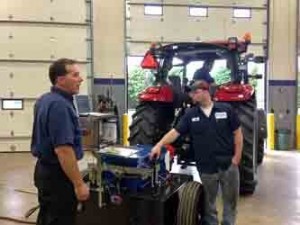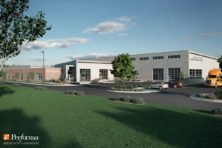NWTC Steps Up Diesel Training
- Share
- Tweet
- Pin
- Share

NWTC students Steve Miller (in the tractor) and Nick Hagen assist diesel and heavy equipment instructor Steve Bretl in showing how the school’s dynamometer measures the torque of the 2014 Case IH tractor that was donated to the school’s program through an agreement with Case IH of Racine and Service Motor Co. of Green Bay. Photo by Jim Lundstrom.
With a partnership between Case IH of Racine, Service Motor Co. of Green Bay and Northeast Wisconsin Technical College (NWTC) of Sturgeon Bay, students in the diesel technology programs at NWTC will now have the very latest in diesel technology to study and work on.
On Thursday, Sept. 4, all the involved parties gathered at the NWTC campus to unveil the new partnership and the 2014 Case IH tractors that the students will be training on.
Before this agreement, students in the diesel program trained on a nearly 100-year-old two-cylinder, 30 horsepower diesel engine. Now they will be working on state-of-the-art diesel technology, and as new Case IH technology comes onto the market, Service Motor will replace the slightly outdated tractors with the latest models through the length of the 10-year agreement.
“We’re going to bring the latest technology to the campus. Every year we’re going to roll up with the freshest technology available at no expense to the campus,” said Kevin Somme, vice president of Service Motor Co. “We want to make sure the students are exposed to the latest technology.”
“If we had to do this on our own, we would not be able to do this,” said Jeffrey Rafn, president of NWTC. “That means when students would be leaving here, they would have great skills, but they would be slightly outdated skills.”
More importantly, he said, it sends an important message to students that businesses want to hire the best and are willing to do their part to make that happen.
“It reassures us that we are doing the right thing because they are confident that we are providing the right kind of training, and that means they are going to hire our students, too,” Rafn said.
However, this is not a purely altruistic relationship.
“The demand for technicians is really outstripping supply at this point,” Rafn said.
Auto dealerships, agricultural equipment dealerships, trucking firms and the oil industry are all jockeying for the 3,500 qualified diesel technicians entering the market through technical schools annually, according to The National Institute for Automotive Service Excellence. That’s not nearly enough to keep up with current growth trends and retirement rates – 10,000 Baby Boomers (who make up 26 percent of the U.S. population) will reach retirement age every day through 2029, according to Pew Research.
Somme pointed out that the 98-year-old Service Motor Co. has six stores with 150 employees.
“We have a good chunk of employees who are planning to retire in the next five years, so we need to keep fully staffed,” he said.
The agreement with the Sturgeon Bay NWTC campus is just one educational partner of Service Motor Co. Somme said they also have agreements with Fox Valley Technical College in Appleton, Northcentral Technical College in Wausau and the University of Wisconsin Agricultural Research stations.
“In the end, as we want to grow and expand,” Somme said, “we’re reaching out to good institutions in the marketplace that we want to partner with for the long term and create a work force for the future.”
“I think it’s an amazing opportunity,” said NWTC student Steve Miller, who graduates in May and is already employed by Diesel Specialists in Green Bay. “I’m really excited and looking forward to looking into the new technology that’s out there. It’s way different from the things you saw in the fields 20, 30 years ago, that’s for sure.”
“It’s a different world than when I started here 25-plus years ago,” said instructor Jon Sowl. “We went from a mechanical engine to what you see now. Ninety percent of the problems they have today in the shops, it’s that emission control system. There’s like 64 different sensors on most engine packages alone, so you have to be a problem solver and a technician. The sky’s the limit for these young people coming in here. This means a lot for our program. We’ve enjoyed some very good partnerships, and this is the latest and greatest of them so we’re very pleased. It’s just another great example of how industry is partnering with our college and identifying with our program here on the Sturgeon Bay campus.”

